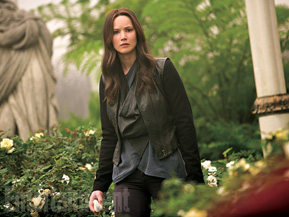Monday Morning Quarterback Part I
By BOP Staff
November 24, 2015
Edwin Davies: It's a mixture of form and content. The book of Mockingjay is pretty grim and depressing compared to the first two, so even if it had been presented as a single film, it would still have been a difficult trick to pull off from an adaptation standpoint. Splitting the story in half reinforced the grimness by spreading it out.
That approach worked for other series in the past, but where the final Harry Potter film(s) got away with it by ensuring that the second half would be this big, rousing finale, Mockingjay could not because that's not how its story is structured. Delaying the true finale by a year made Part 1 seem less essential, and the lackluster quality of Part 1 in turn made Part 2 seem less essential still, so the audience drifted away faster than they probably would have if Lionsgate had put out a single film.
David Mumpower: I'm going to explicitly state what others are hinting at. The first two novels in The Hunger Games series engage the reader with a dazzling spin on the nature of celebrity and reality television. Mockingjay takes a sharp turn toward PTSD and the grim realities of war. I'm not joking when I say that I've been fearing the day that my brother, a huge fan of the The Hunger Games movies who has never read the books, saw the resolution.
Without providing spoilers, the subject matter is every bit as grim as the post-9/11 war films that Americans soundly rejected at the box office. The situation is historically unprecedented in that regard. Lionsgate enticed audiences with a sublime introduction to the world of Panem. Then, they turned around and kicked every fan in the junk with Mockingjay Parts 1 and 2. I cannot remember a similar situation since the Matrix sequels.
Kim Hollis: How will you remember the Hunger Games franchise?
Ben Gruchow: I'll remember it as a series that started out with an irresistible hook, and developed into something more uncompromising, more pragmatic, and more challenging with each entry...while still being more accessible, with its vision of the story's world, than most YA genre fiction. When it comes to the books, it'll be a reminder of how a book doesn't need to be gigantically long in order to convey an epic scope. When it comes to the films, I'm going to remember it as a blockbuster series that actually ended up being about something thematically beyond the broad strokes of its story or a vague concept, and one that carried that message all the way to its logical conclusion. It's not the only blockbuster series to do that, nor is it the best of them, but it punched far above its weight class for a series that basically needed to show up and nothing else in order to attract an audience.
J. Don Birnam: Overall it's a great franchise and I was sad in the last few scenes to see it go.
But the biggest thing for me was that the franchise launched the person who is right now the biggest superstar in the world, led her to one and maybe more Oscar wins, and cemented the status of female-driven movies as a forced to be reckoned with at the box office.
The original Hunger Games became the first movie in decades to lead the yearly box office and have a lead female character. That is a stunning statistic in many ways, and could signify the beginning of a real rise in demographic power for females in Hollywood. Voting with dollars, so to speak.
Max Braden: I don't remember if I read the first novel before the first movie or vice versa, but what immediately stuck out at me was that I disliked all the characters. I didn't like how Katniss was a brat to Peeta, I didn't like how he was weak, I didn't like how Haymitch was completely useless in his job, and I didn't like how Snow came across as a one-dimensional Bond villain. I didn't bother reading the other books and only watched the movies as a completionist. But overall I think there are better underdog/rebellion movies out there. The one strong positive memory I will keep from the series is that moment when Katniss is being elevated into the playing field just before the Games begin; the tension and suspense in that moment was great. I suppose one other takeaway of the series is that if it inspires young girls to be more confident in themselves, that's always a good thing. I don't know what sociologists would say about that but with the premiere of Supergirl on TV and its unabashedly feminist themes targeted at a young female audience, that trend seems to have been embraced in TV and film.
Continued:
1
2
3
4
5
|
|
|
|




